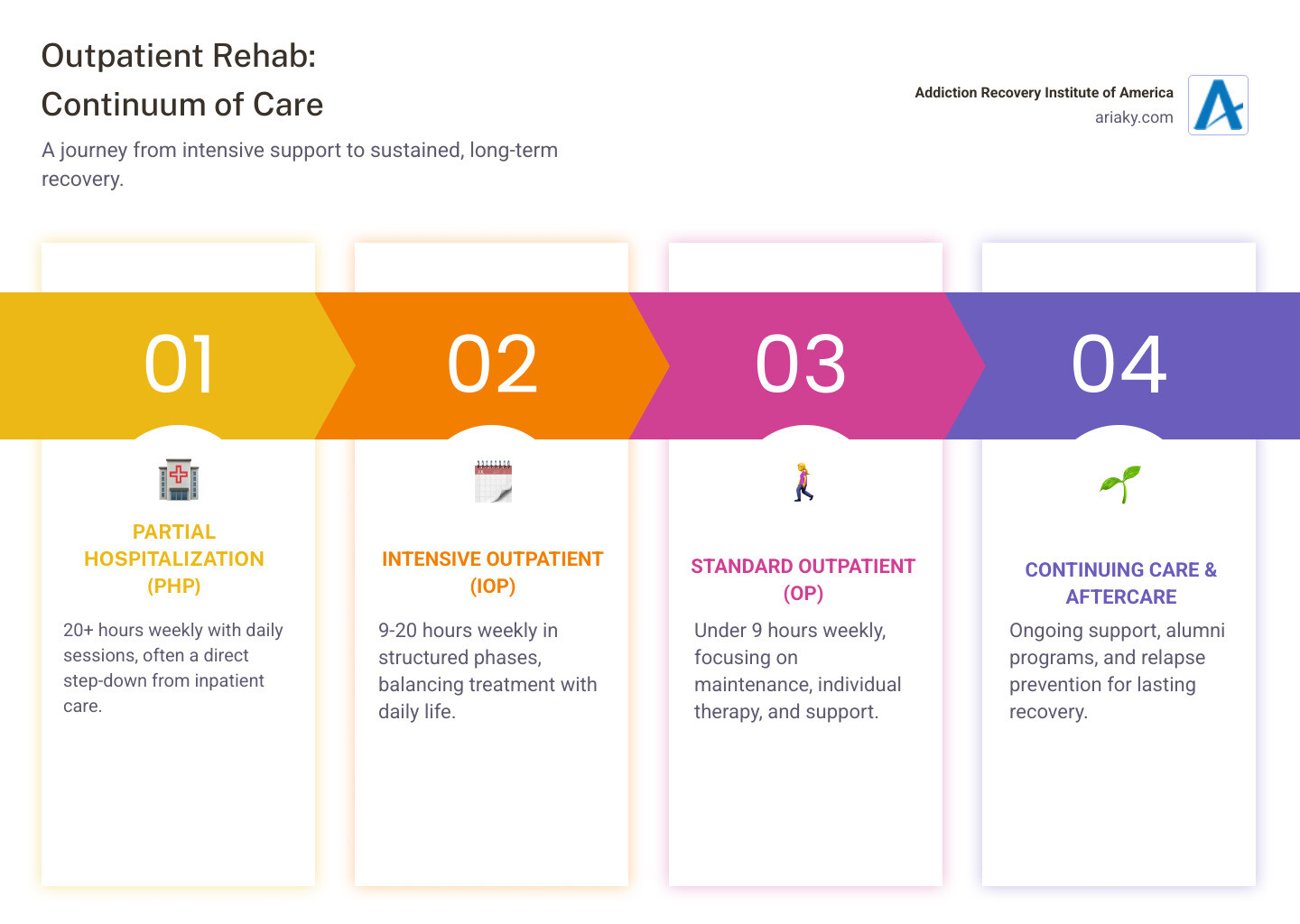Why Outpatient Drug Rehab Offers Hope for Recovery
Outpatient drug rehab programs provide addiction treatment that allows you to live at home and maintain daily responsibilities like work, school, or family care. This flexible alternative to inpatient care offers professional support for substance use disorders without requiring you to put your life on hold.
Key Facts About Outpatient Drug Rehab:
- Cost: Typically $2,000-$5,500 for 1-3 months vs. $20,000-$30,000 for inpatient care
- Time Commitment: Ranges from under 9 hours/week (standard) to 20+ hours/week (intensive)
- Best For: Mild to moderate addiction, a strong support system, and a stable living situation
- Program Types: Partial Hospitalization (PHP), Intensive Outpatient (IOP), Standard Outpatient, Continuing Care
- Services: Individual therapy, group counseling, medication-assisted treatment, family involvement
Many people hesitate to seek help due to cost, time commitments, or the reluctance to admit a problem. Outpatient programs bridge this gap by offering accessible, professional treatment that integrates into your life. This model allows you to apply new coping skills in real-world situations while supported by your community.
These programs are ideal for those who have completed detox, have a safe home environment, and are motivated to change. They also serve as a crucial step-down for individuals leaving inpatient care or for professionals who cannot take extended leave from their careers.

Understanding the Core of Outpatient Drug Rehab
Outpatient drug rehab provides professional addiction treatment while you live at home. You attend scheduled therapy sessions and group meetings, then return to your daily life. This approach offers expert help while allowing you to maintain your routine.
This model is effective for individuals with mild to moderate addiction who have completed detox and have a strong support system and stable home life. It’s also an excellent step-down from an inpatient program, offering more independence. Unlike the 24/7 structured environment of inpatient rehab, outpatient care allows you to immediately apply learned coping skills at work, with family, and in your community. You can maintain your work and school commitments, ensuring privacy while building a foundation for recovery. At Addiction Recovery Institute of America, we offer comprehensive Substance Abuse Treatment in Kentucky custom to your needs.
The Benefits of Outpatient Treatment
The flexibility of outpatient treatment is a primary benefit, with morning, evening, and weekend sessions available to fit your schedule. This structure allows you to get help without sacrificing your responsibilities.
Affordability makes treatment more accessible. By eliminating costs for room and board, outpatient programs are significantly less expensive than residential care. Most insurance plans provide coverage, and financial aid is often available.
A key advantage is the real-world application of skills. You can practice coping strategies learned in therapy in your home environment and discuss any challenges with your group shortly after they occur. This immediate feedback loop accelerates recovery.
Family involvement is naturally integrated since you live at home. Loved ones can join therapy sessions to learn how to support you, heal relationships, and rebuild trust. This approach also ensures privacy and helps you stay connected to your community, building a sustainable, sober life. We provide Kentucky Drug and Alcohol Rehab Programs that leverage these benefits for lasting success.
Cost of Outpatient vs. Inpatient Rehab
Finances are a major factor in treatment decisions. Outpatient drug rehab is significantly more affordable than inpatient care because it doesn’t include costs for housing, meals, and 24/7 staffing.
Most insurance plans, including Medicaid, Medicare, and ACA plans, are required to cover substance use treatment. We recommend contacting your provider to understand your specific benefits. For those without insurance, financial assistance options like government programs, grants, and sliding-scale fees are available. We can help you explore these options.
| Feature | Inpatient Rehab | Outpatient Rehab |
|---|---|---|
| Living Situation | At the treatment facility 24/7 | At home or sober living |
| Cost Range | Significantly higher monthly costs | More affordable monthly costs |
| Medical Supervision | Round-the-clock medical staff | Scheduled appointments with clinical staff |
| Treatment Intensity | Highly structured, immersive daily programming | Flexible intensity from standard to intensive levels |
| Schedule Flexibility | Full-time commitment required | Work/school/family responsibilities maintained |
| Services Included | Detox, therapy, medical care, meals, housing | Individual/group therapy, MAT, family counseling, education |
| Best Suited For | Severe addiction, unsafe home environment, multiple medical issues | Mild-moderate addiction, stable home, motivated individuals |
Understanding the Overview of Addiction and Recovery Treatment Services helps clarify how different levels of care support your journey.
Types of Outpatient Programs and Services

Outpatient drug rehab is not a one-size-fits-all solution. It offers various levels of care to match your specific needs, creating a Continuum of Care that allows you to step up or down in intensity as you progress in your recovery.
Levels of Outpatient Care
-
Partial Hospitalization Programs (PHP): The most intensive level, PHP involves 20+ hours of treatment per week (e.g., 4-6 hours daily, five days a week). Often called “day programs,” they provide significant structure while you return home each evening. This is ideal for those needing high support but have a stable home. Our Lexington PHP Treatment: Complete Guide provides more detail.
-
Intensive Outpatient Programs (IOP): Offering a balance of support and flexibility, IOPs require 9 to 20 hours of treatment weekly. Sessions are often held in the mornings or evenings, allowing you to maintain work or school schedules while focusing on relapse prevention and coping skills. Learn about our Outpatient Treatment Program (IOP) in Kentucky.
-
Standard Outpatient Programs (OP): The most flexible option, with fewer than 9 hours of treatment weekly (e.g., one individual and one group session). This level is suited for mild substance use issues or as a step-down from more intensive care.
-
Continuing Care (Aftercare): This is the long-term support network that follows formal treatment. It includes alumni programs, support groups, and regular check-ins to help you maintain a fulfilling life in recovery.
What Services Are Offered in an Outpatient Drug Rehab Program?
Outpatient programs provide a comprehensive suite of services to address all facets of recovery.
- Individual and Group Therapy: Individual counseling offers a private space to explore personal challenges, while group therapy provides peer support from others with shared experiences.
- Family Therapy: These sessions help heal relationships, improve communication, and build a supportive home environment for recovery.
- Medication-Assisted Treatment (MAT): MAT combines FDA-approved medications with therapy to treat substance use disorders, primarily for opioid and alcohol addiction. It reduces cravings and withdrawal symptoms, allowing you to focus on psychological healing.
- Relapse Prevention and Life Skills: Education focuses on identifying triggers and developing coping strategies. Life skills training helps with stress management, communication, and financial planning.
- Holistic Therapies and Medical Care: Many programs include yoga, mindfulness, or art therapy to heal the mind, body, and spirit. Regular medical consultations ensure your physical health is also addressed. We offer diverse Addiction Therapy in Kentucky because the role of therapy in addiction treatment is multifaceted.
The Central Role of Group Therapy
Group therapy is often the core of the outpatient experience. It combats the isolation of addiction by fostering peer support and a sense of community. Hearing shared experiences provides new insights and coping strategies, while the group setting encourages accountability in a compassionate environment. It’s also a safe place to practice and develop social skills that may have been impacted by substance use. Our IOP Program in Lexington emphasizes group therapy, recognizing its power to build collective strength.
Choosing the Right Program and Ensuring Success

Choosing the right outpatient drug rehab is a critical step. Look for a program with a thorough assessment process that considers your substance use history, mental health, and personal goals to create a custom treatment plan.
Consider the program philosophy—whether it’s 12-step based, focused on evidence-based therapies like CBT, or uses another approach. Ensure staff are licensed and the facility has accreditation from a reputable organization, which signals a high standard of care. Finally, practical factors like location and schedule flexibility are crucial for consistent attendance. Our Substance Use Disorder Services are designed to help you find the right fit.
What is the Duration of Outpatient Drug Rehab Treatment?
The length of outpatient drug rehab varies, but most structured programs last 2-5 months on average. The timeline depends on factors like the severity of your addiction, your individual progress, and the presence of any co-occurring mental health conditions. Treatment is not a race; it’s a process of building lifelong skills. You may transition from intensive programs to standard care and eventually to long-term recovery maintenance. Our Kentucky Addiction Treatment Therapy Programs adapt to your needs throughout this journey.
Factors for Success and Family Involvement
Success in outpatient drug rehab is strongly linked to your personal motivation and willingness to engage in the process. A stable and supportive living environment, free from major triggers, is equally crucial.
A strong support system, especially family, is a key asset. Family therapy is highly beneficial, as it educates loved ones about addiction, improves communication skills, and helps rebuild trust. When a family heals together, the foundation for lasting recovery becomes much stronger. Addiction treatment professionals agree that recovery thrives in a community, and family is often the most important one.
Understanding the Success Rate of Outpatient Programs
When considering the success rate of outpatient drug rehab, it’s important to define success broadly. Beyond abstinence, success includes improved quality of life, restored relationships, better mental and physical health, and a renewed sense of purpose.
Individual factors like age, substance use history, and mental health status heavily influence outcomes, which is why personalized treatment is vital. We view addiction through the chronic disease model, similar to diabetes. This means ongoing management and occasional treatment adjustments are normal parts of the recovery process, not failures. For more information, explore national resources on addiction recovery. Seeking help is the first, most important success.
Navigating Recovery: Modern Approaches and Challenges

Modern outpatient drug rehab programs use cutting-edge approaches to make treatment more accessible and effective. While these advances present new challenges, they also offer unprecedented opportunities for healing, supported by data from resources like SAMHSA.gov.
How Medication-Assisted Treatment (MAT) Fits In
Medication-Assisted Treatment (MAT) is a transformative approach for opioid and alcohol addiction. It combines FDA-approved medications with counseling to stabilize brain chemistry while you develop recovery skills.
- Buprenorphine (Suboxone): Reduces opioid cravings and withdrawal symptoms, making it easier to focus on therapy.
- Naltrexone (Vivitrol): Blocks the euphoric effects of opioids and alcohol, removing the “reward” of using and making relapse less likely.
MAT is most powerful when integrated with therapy, as it addresses both the physiological and psychological aspects of addiction simultaneously.
The Rise of Telehealth in Outpatient Care
Technology has revolutionized access to care. Virtual visits via smartphone or laptop allow you to attend therapy from anywhere, which is a lifeline for those in rural areas or with busy schedules.
Telehealth offers discretion for professionals, eliminates transportation barriers, and helps reduce health disparities by bringing quality care to underserved communities. It makes treatment possible for many who would otherwise go without. Digital tools like Mobile Apps and Services can provide additional support.
Transitioning from Inpatient and Managing Challenges
Moving from inpatient to outpatient drug rehab involves a significant shift towards increased independence and personal responsibility. You will be managing your own schedule and navigating real-world triggers without 24/7 supervision.
This transition is where applying coping skills becomes critical. You must actively manage stress, cravings, and difficult relationships using the tools learned in treatment. It requires active management of your care, including attending appointments and reaching out for help. Practical obstacles like unstable housing or financial stress can also pose challenges. Our Outpatient Treatment Program in Kentucky is designed to help you steer this transition, building confidence as you take the next step in your journey with access to Behavioral Health Resources.
Frequently Asked Questions about Outpatient Drug Rehab
Is outpatient rehab effective for severe addiction?
Outpatient drug rehab is a crucial component of recovery from severe addiction, but typically not the first step. The most effective path for severe substance use disorder often starts with medically supervised detox and inpatient or residential treatment to establish stability. Afterward, outpatient care serves as an essential step-down treatment, helping you transition back to daily life with structured support. Its effectiveness depends on your motivation, the stability of your home environment, and your support system.
Can I keep my job while attending an outpatient program?
Yes. One of the primary advantages of outpatient drug rehab is its design, which allows you to maintain your career. Programs offer flexible scheduling, including morning, evening, and weekend sessions, to accommodate work responsibilities. Keeping your job can provide financial stability and a sense of purpose that supports your recovery.
How do I know if outpatient rehab is the right choice for me?
Determining if outpatient rehab is right for you involves evaluating a few key areas. Consider your motivation level, as outpatient care requires self-discipline. Assess your home situation—it should be stable and supportive, not filled with triggers. A strong support network of family and friends is also vital. Finally, consider the severity of your addiction; if you require medical detox or have severe co-occurring disorders, a higher level of care may be needed first. The best way to know for sure is to undergo a comprehensive assessment with an addiction professional who can recommend the appropriate level of care.
Take the First Step Towards Flexible Healing
Deciding to seek help is a courageous first step. Outpatient drug rehab offers a unique path to recovery, empowering you to heal while staying connected to your job, family, and home. It’s recovery designed to fit your life.
You don’t have to steer this journey alone. At the Addiction Recovery Institute of America (ARIA), we provide individualized care that honors your unique circumstances. Our team is here to help you build a treatment plan that works for you.
Recovery is possible without putting your life on pause. Outpatient care allows you to apply new coping skills in real-time, building resilience and confidence each day. This is about creating a life so fulfilling that old patterns lose their power.
Your new chapter is waiting. Take control of your future and find how the right support can transform your life. Learn more about substance abuse treatment centers in Kentucky and see how ARIA can help you build the sober, meaningful life you deserve.


